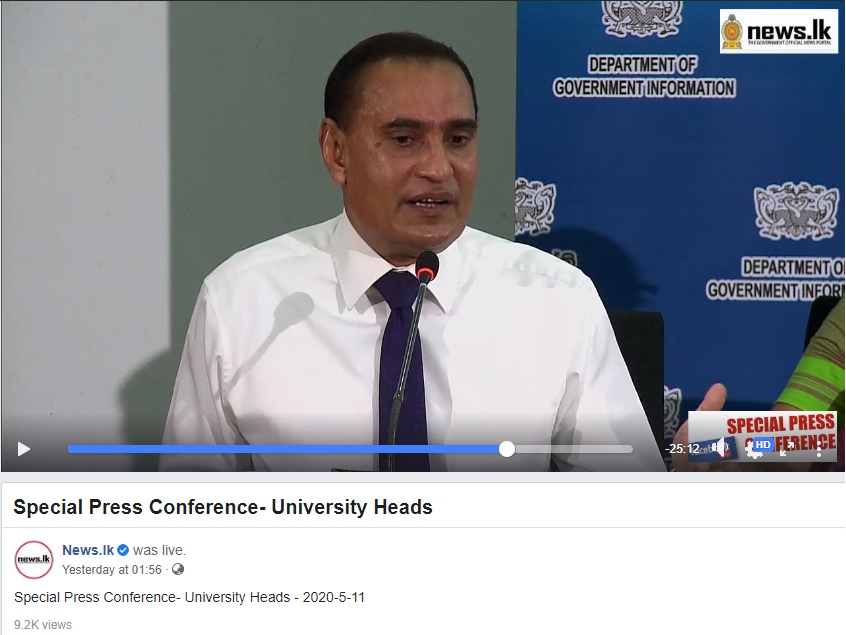SLIIT has been planning their online lecture platform since 21 April 2019. Vice Chancellor of SLIIT, Prof. Lalith Gamage said the Easter attack got them thinking as the university had until then, not closed for any reason, since it opened its doors in 1999.
SLIIT helped Gurugedara
Prof. Gamage was speaking at a special press conference called by Anura Dissanayake, Secretary of the Ministry of Higher Education, together with heads of Universities in Sri Lanka on 11th May. The Secretary expressed the Ministry’s appreciation of SLIIT, for willingly stepping in to offer their expertise and services in support of the Ministry’s Gurugedera programme on Channel Eye for Scholarship, A Level and O Level students. Mr Dissanayake said that SLIIT’s support came at a time when they were facing a considerable challenge to structure content and were looking for the best way to present lessons to students to capture their attention. SLIIT had not only helped in giving valuable advice on content and presentation, but also provided support in the production by allowing the use of their own facilities to record programmes.
A better way
Professor Gamage speaking at the press conference said they recognised the need for an alternative method of teaching to handle any eventuality, and began by providing students with recorded lectures. “Apart from being a useful way of learning in a crisis, this also helps some students to understand better. Sometimes a student may not understand the entire content of a lecture given in a big classroom, but with a recording they can replay at home and clarify things. It’s an extra tool to understand what was taught.”
We were ready
“When all universities had to close on the 13th due to the lockdown, we were ready to go online fully, but were uncertain to what degree the students will engage in terms of watching videos and lessons online. So we explained to our students helping them understand how it will work, and instructed them how to watch, take notes and connect with us. We started the online platform on the 18th of March and to our surprise 8,000 students engaged” said the Vice Chancellor of SLIIT.
Support appreciated
The Secretary of the Ministry of Higher Education, addressing the conference, expressed his appreciation of the support given by SLIIT for the ‘Gurugedara’ program. He said that SLIIT, today stands as one of Sri Lanka’s most renowned educational institutions, who has earned itself a name as a non-profit university. “We had the will to create an educational channel for our children on terrestrial TV but our big challenge was creating the right content. SLIIT came forward to help and extended their support not only in consulting on content and presentation but even providing their own facilities to record our programs.” The Secretary said he had invited the Vice Chancellor to address the forum because of his willingness to support education in general, and particularly, his experience in the higher education field.
Proactive intervention
Professor Gamage says alternative methods of learning helps students to get an education without delay. “Some may ask why the necessity for this speed and why not wait until the coronavirus scare is over? But I am speaking from a global perspective - while some industries may see less activity post the lockdown, in some fields workload will increase and more job opportunities will open up, both locally and abroad. If our students have graduated by this time, they can fit into some of these jobs and get on with life. That is our expectation. Apart from that, we need our graduates to develop our economy. That is why the ministry has extended their support to us and encouraged us in this.
We send a report to the Ministry every day on the progress we are making and the Ministry’s interest motivates us.”
No lack of innovation
The professor said that as expressed by both the Secretary of the Ministry of Higher Education and the Chairman of the UGC, Sri Lankan students do not lack innovation. He says if one takes a foreign university into account, every one of their students own a laptop which is not the case for our students. “We study how students get connected to the system. 78% have access to a laptop or a desktop computer. 21% connect through their phones. So you can see the interest and enthusiasm they have - these students even do online exams like this.”
Grateful to service providers
The Vice Chancellor says 95% of SLIIT students follow online lectures, and the university has not discounted the remaining 5%. Once things are back to normal and these students can return, the university plans on having revision classes and exams for them to get them back on track. Professor Gamage says he is very grateful to SLT and Dialog for helping students by not charging them for wifi usage when they connected to the SLIIT server for online lectures. “I know that state universities would not encounter this problem but these service providers extending their support to our students meant a great deal to us.” The professor says while SLIIT has its share of students who come from wealthy backgrounds, there are more who come from middle-income families where sometimes parents sell assets such as real estate to educate their children. He says not having to pay for internet facilities would greatly benefit these students.
The professor added that several other institutions have also joined the online platform. The CINEC campus, Horizon, IIHS and Saegis are some of the universities who have been successful in conducting their courses online.



